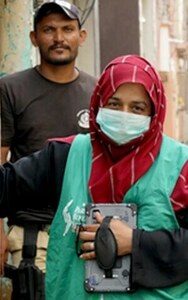KARACHI: With the deadline for the country’s first digital census approaching on April 10, the Pakistan Bureau of Statistics (PBS) said on Wednesday that more than 90 per cent of work had been completed in Punjab, Sindh and Khyber Pakhtunkhwa.
However, according to official data released on Wednesday, Islamabad and Balochistan trail significantly behind, with 72pc and 62pc work completed so far, respectively,
The brief and sketchy details shared by the PBS also referred to the contribution of 121,000 field enumerators, who have made the exercise possible within the stipulated period, which was revised only on Tuesday, when the bureau extended the last date of field operations from April 4 to 10.
However, the PBS statement didn’t explain the reason behind the below-par performance in Islamabad and Balochistan and how it planned to complete the remaining work in five days.
Progress abysmally low in Balochistan, where 40pc work needs to be completed within five days
“The digital census is a huge success and a moment of pride for the nation,” the PBS said, adding that so far, 40 million households had been counted and geotagged and 92pc of the census work had been successfully completed, including 95pc in KP, 95pc in Punjab, 92pc Sindh, and 62pc in Balochistan.
“The smooth workflow and technology innovations, data of almost 10m people is daily synched without any issues or technical glitches,” it said. “This is a huge win for Pakistan.”
PBS officials didn’t respond to calls for further clarity on the breakdown of provincial data provided by the federal agency. The statement, however, lauded the role of provincial governments in ensuring the coverage of areas under respective administrations.
“The provincial governments are playing a major role in ensuring 100pc coverage while ensuring the quality and credibility of the whole census process,” it said. “The real-time data progress monitoring dashboards, provided by PBS down to provincial and district governments, allows for a completely transparent process and continuous oversight of field operations. The dashboard also helps provincial governments in identifying any abnormalities, any areas missed and any other emerging anomalies on a daily basis.”
It also shared the methodology based on “universal inclusion,” which ensures the area of every individual who’s counted depending on their livelihood.
“The current methodology ensures universal inclusion, which means that each and every individual living in the location for six months or planning to live there for another six months, and will be using resources around that location, regardless of their nationality, geography, ethnicity, identity, affiliations, politics, caste or creed, will be counted,” the PBS said.
The PBS has also supported the provincial and district governments by setting up a helpline 080057574 and SMS gateway 9727 where people can call for queries or report anyone or any area missed.
“Recently, on the directions of the prime minister of Pakistan, the 495 census support centres are now also working as points of referral for all missed areas,” it added.
Published in Dawn, April 6th, 2023












































Dear visitor, the comments section is undergoing an overhaul and will return soon.